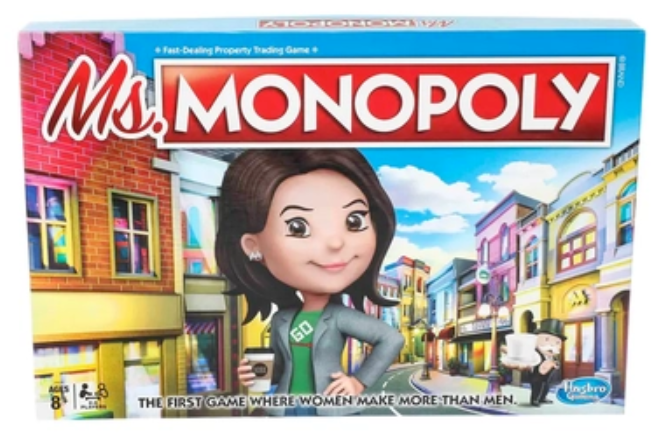Back in 2019, Hasbro released a woke feminist version of one of its more historically popular board games, as Monopoly. Ms. Monopoly “recognizes inventions that women created or contributed to and gives bonuses to female players.”
That’s the sanitized Wikipedia description. What they mean by bonuses is that “Women get $1,900 at the start of the game and receive $240 salary when passing “Go,” whereas men start with $1,500 and receive a $200 salary.”
I’m not sure who made those choices, but my first thought was how insulting it is to women. In the regular version, everyone starts out the same, and sex is irrelevant. Gameplay and a bit of luck decide who wins. An observation shared across the political spectrum.
Reception towards Ms. Monopoly was mostly negative upon its announcement. Eric Thurm, the author of “Avidly Reads: Board Games”, said the game created a “surface-level fantasy world” where women succeed simply because of their gender. Madeleine Kearns of National Review called it “patronizing pointlessness”. Queens College‘s philosophy department head Christine Sypnowich said it was “unhelpful to portray women as needing special advantages.” Jennifer Borda, an associate professor specializing in feminist studies at the University of New Hampshire, suggested that it would be more suitable if male players instead faced challenges women face in the workplace.
I’m not sure what those challenges are. I know they exist, but I am not a woman, so I can’t possibly see that work through their eyes. I can say that even back in the 70s, I had female superiors. Bosses. Managers. No more or less competent than their male equivalents. They either knew and did their job, or they didn’t. Sex was irrelevant. I understand that’s not true everywhere, certainly not then and to some extent now, but these days, women graduate college at higher rates and make decent money, not that it matters in this economy.
There will always be glass ceilings and hurdles. Women haven’t made any sort of an inroad into men’s professional sports (for obvious reasons), and there aren’t very many female undersea welders or oil rig workers. I could list dozens of high-paying, dangerous jobs women don’t want, and there is an equally long list of things women don’t want in many other jobs that make them less of an asset and that likely affect pay.
Men and women are different in many ways, including how they view work, location, willingness to travel, hours, commitment, and job choices.
Ms. Monopoly does us a disservice by making assumptions that even women find insulting.
Maybe Monopoly needs a Trans Ms. Monopoly. A world where men pretending to be women have more rights and opportunities than actual women.
We’ll be waiting.
